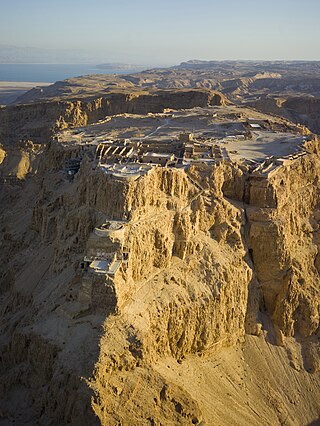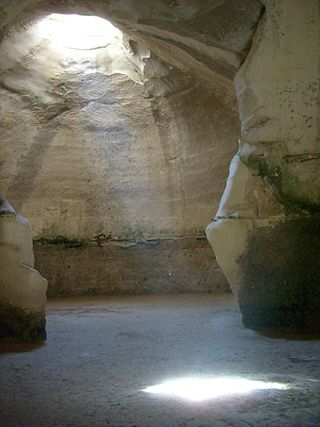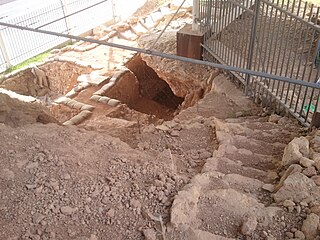
Masada is an ancient fortification in the Southern District of Israel situated on top of an isolated rock plateau, akin to a mesa. It is located on the eastern edge of the Judaean Desert, overlooking the Dead Sea 20 km (12 mi) east of Arad.

Scorpions are predatory arachnids of the order Scorpiones. They have eight legs, and are easily recognized by a pair of grasping pincers and a narrow, segmented tail, often carried in a characteristic forward curve over the back and always ending with a stinger. The evolutionary history of scorpions goes back 435 million years. They mainly live in deserts but have adapted to a wide range of environmental conditions, and can be found on all continents except Antarctica. There are over 2,500 described species, with 22 extant (living) families recognized to date. Their taxonomy is being revised to account for 21st-century genomic studies.

The Dead Sea Scrolls are ancient Jewish religious manuscripts discovered between 1946 and 1956 at the Qumran Caves in what was then Mandatory Palestine, near Ein Feshkha in the West Bank, on the northern shore of the Dead Sea. Dating from the 3rd century BCE to the 1st century CE, the Dead Sea Scrolls are considered to be a keystone in the history of archaeology with great historical, religious, and linguistic significance because they include the oldest surviving manuscripts of entire books later included in the biblical canons, along with deuterocanonical and extra-biblical manuscripts which preserve evidence of the diversity of religious thought in late Second Temple Judaism. At the same time they cast new light on the emergence of Christianity and of Rabbinic Judaism. Almost all of the 15,000 scrolls and scroll fragments are held by Israel in the Shrine of the Book at the Israel Museum. Israel's custody of the scrolls is disputed by Jordan and the Palestinian Authority on territorial, legal and humanitarian grounds – they were mostly discovered during the period of Jordanian control of the West Bank and captured by Israel in the 1967 Six Day War – whilst Israel's claims are primarily based on historical and religious grounds given their significance in Jewish history and in the heritage of Judaism.

Pseudoscorpions, also known as false scorpions or book scorpions, are small, scorpion-like arachnids belonging to the order Pseudoscorpiones, also known as Pseudoscorpionida or Chelonethida.

Ramla or Ramle is a city in the Central District of Israel. Today, Ramle is one of Israel's mixed cities, with both a significant Jewish and Arab populations.

The Ayyalon Cave is a large limestone cave near Ramla, Israel in which new species of crustaceans were discovered in April 2006. It has been studied for its complex food web, which survived for millions of years without light or organic food coming in from the surface, being based solely on a type of bacterium which feeds on sulfur which serves as the only organic matter available for the next higher level of organisms to feed on. The cave has offered an ecological refuge for species whose relatives living at the surface have been wiped out by climatic changes and catastrophic events over millions of years, and offers a unique sample for the study of long-term ecological changes in the area.

Peki'in or Buqei'a, is a Druze–Arab town with local council status in Israel's Northern District. It is located eight kilometres east of Ma'alot-Tarshiha in the Upper Galilee. In 2021 it had a population of 6,026. The majority of residents are Druze (78%), with a large Christian (20.8%) and Muslim (1.2%) minorities.
4Q108 is a fragment containing a portion of the Song of Songs (3:7–8) in Hebrew. Fragments from three such scrolls were found in Cave 4 at Qumran. These, and 6Q6 from Cave 6, estimated from 2nd century BCE, comprise the total witness to the Song from the Dead Sea Scrolls, known so far.

Beit Guvrin-Maresha National Park is a national park in central Israel, containing a large network of caves recognized by UNESCO as a World Heritage Site. The national park includes the remains of the historical towns of Maresha, one of the important towns of Judah during the First Temple Period, and Bayt Jibrin, a depopulated Palestinian town known as Eleutheropolis in the Roman era. However, Maresha and Bayt Jibrin are not part of the UNESCO site, which covers only the cave network.

Qesem cave is a Lower Paleolithic archaeological site near the city of Kafr Qasim in Israel. Early humans were occupying the site by 400,000 until c. 200,000 years ago.

Amos Frumkin is an Israeli geologist and speleologist.

Wadi Murabba'at, also known as Nahal Darga, is a ravine cut by a seasonal stream which runs from the Judean desert east of Bethlehem past the Herodium down to the Dead Sea 18 km south of Khirbet Qumran in the West Bank. It was here in caves that Jewish fighters hid out during the Bar Kochba revolt, leaving behind documents that include some letters signed by Simon Bar Kochba.
HaAh HaGadol 5 is the fifth season of the Israeli version of the reality show Big Brother. The season began broadcasting on 5 May 2013, and ended on 27 August 2013. Eighteen housemates entered the house during the premiere, and another five housemates joined after sixty-six days. It is the first season to be broadcast in 16:9 widescreen format. It was also the longest-running Israeli season at the time, lasting 115 days, until it was surpassed by season 9 which ran for 120 days.
Hapoel Tel Aviv is an Israeli women's football club from Tel Aviv. The club competed in the Israeli First League and the Israeli Women's Cup, winning them both in 2000–01 and competing in 2001–02 UEFA Women's Cup. The club folded in 2002. The club relaunched in 2019 and competed in the third league. They won the third division title in 2020–21 and were promoted to the second league.
Cave of Horror is the nickname given to what archaeologists have catalogued as Nahal Hever Cave 8 (8Hev) of the Judaean Desert, Israel, where the remains of Jewish refugees from the Bar Kokhba revolt were found.
Abattoir Hill, pronounced in Hebrew as Giv'at Bet Hamitbahayim, is an archaeological site in Tel Aviv, Israel, located near the southern bank of the Yarkon River. The site is a natural hill made of Kurkar, a local type of sandstone. In 1930 ancient burials and tools were discovered upon the construction of an abattoir on top of the hill, hence its name. Between 1950 and 1953, Israeli archaeologist Jacob Kaplan studied the site, ahead of the construction of new residential units and streets on it. He discovered the remains of burials and small settlements spanning from the Chalcolithic period to the Persian period. In 1965 and 1970 Kaplan conducted two more excavations next to the slaughterhouse and discovered settlement remains from the Bronze Age and the Persian period. In February 1992 a salvage excavation was conducted by Yossi Levy after antiquities were damaged by development works. Two burial tombs dated between the Persian period and the Early Arab period were discovered. In June 1998 another salvage excavation was conducted by Kamil Sari after ancient remains were damaged by work of the Electric Corporation. Two kilns were unearthed, similar to two found by Kaplan.

Levana Moshon is an Israeli writer, journalist, teacher and children's storyteller.












